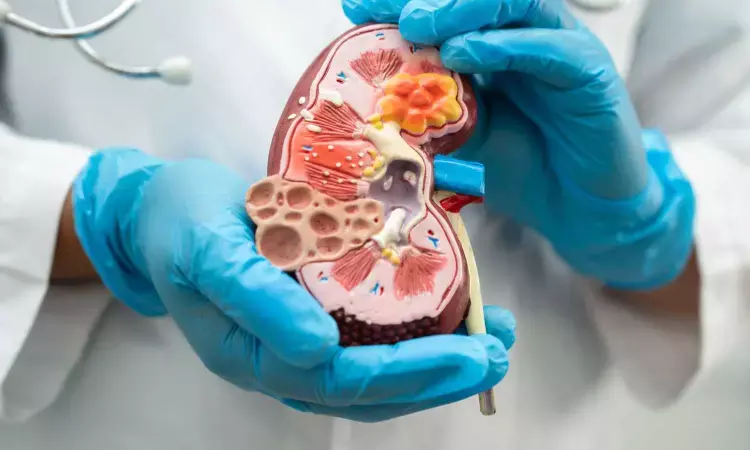- Home
- Medical news & Guidelines
- Anesthesiology
- Cardiology and CTVS
- Critical Care
- Dentistry
- Dermatology
- Diabetes and Endocrinology
- ENT
- Gastroenterology
- Medicine
- Nephrology
- Neurology
- Obstretics-Gynaecology
- Oncology
- Ophthalmology
- Orthopaedics
- Pediatrics-Neonatology
- Psychiatry
- Pulmonology
- Radiology
- Surgery
- Urology
- Laboratory Medicine
- Diet
- Nursing
- Paramedical
- Physiotherapy
- Health news
- Fact Check
- Bone Health Fact Check
- Brain Health Fact Check
- Cancer Related Fact Check
- Child Care Fact Check
- Dental and oral health fact check
- Diabetes and metabolic health fact check
- Diet and Nutrition Fact Check
- Eye and ENT Care Fact Check
- Fitness fact check
- Gut health fact check
- Heart health fact check
- Kidney health fact check
- Medical education fact check
- Men's health fact check
- Respiratory fact check
- Skin and hair care fact check
- Vaccine and Immunization fact check
- Women's health fact check
- AYUSH
- State News
- Andaman and Nicobar Islands
- Andhra Pradesh
- Arunachal Pradesh
- Assam
- Bihar
- Chandigarh
- Chattisgarh
- Dadra and Nagar Haveli
- Daman and Diu
- Delhi
- Goa
- Gujarat
- Haryana
- Himachal Pradesh
- Jammu & Kashmir
- Jharkhand
- Karnataka
- Kerala
- Ladakh
- Lakshadweep
- Madhya Pradesh
- Maharashtra
- Manipur
- Meghalaya
- Mizoram
- Nagaland
- Odisha
- Puducherry
- Punjab
- Rajasthan
- Sikkim
- Tamil Nadu
- Telangana
- Tripura
- Uttar Pradesh
- Uttrakhand
- West Bengal
- Medical Education
- Industry
PPI use among kidney transplant recipients tied to increased fatigue, poor health-related QoL

Netherlands: The use of proton pump inhibitors (PPI) among kidney transplant recipients may lead to severe fatigue, fatigue severity, and lower mental and physical health-related quality of life, a new study has suggested. The study was published online in the American Journal Of Kidney Diseases.
Proton pump inhibitors (PPIs) are commonly prescribed medications for the management of acid-related gastrointestinal disorders.
Tim J. Knobbe and colleagues aimed to investigate the potential association between PPI use and fatigue as well as health-related quality of life among 937 kidney transplant recipients. Participants were at least one-year post-transplantation and were enrolled in the TransplantLines Biobank and Cohort Study.
● The results of the study revealed significant associations between PPI use and fatigue severity, with a regression coefficient of 4.02 (95% CI, 2.18 to 5.85; P < 0.001).
● Kidney transplant recipients who were on PPIs had a higher risk of experiencing severe fatigue, with an odds ratio of 2.05 (95% CI, 1.48 to 2.84; P < 0.001).
● The use of PPIs was also linked to lower physical health-related quality of life (regression coefficient −8.54; 95% CI, −11.54 to −5.54; P < 0.001) and lower mental health-related quality of life (regression coefficient −4.66; 95% CI, −7.15 to −2.17; P < 0.001).
These associations were found to be independent of potential confounding factors, such as age, time since transplantation, history of upper gastrointestinal disease, antiplatelet therapy, and the total number of medications. The link between PPI use and fatigue was observed across all individually assessed PPI types and was found to be dose-dependent.
While the study does not establish a causal relationship between PPI use and fatigue, the findings raise important considerations for kidney transplant recipients. Fatigue is a common and debilitating symptom that can significantly impact an individual's quality of life. The study suggests that PPI use might be an accessible target for addressing fatigue and improving health-related quality of life in this population.
The authors acknowledge the limitations of their observational study and emphasize the need for further research to explore the effects of PPI exposure among kidney transplant recipients. Until then, healthcare professionals should carefully consider the potential benefits and risks of PPI use in this patient population and explore alternative treatment options when appropriate.
In conclusion, this study sheds light on the potential impact of PPI use on kidney transplant recipients' well-being, emphasizing the importance of comprehensive patient care and personalized treatment approaches in managing gastrointestinal issues after transplantation. As more research unfolds, healthcare providers can better tailor treatment regimens to enhance the overall health and quality of life of kidney transplant recipients.
Reference:
Knobbe, T. J., Kremer, D., Douwes, R. M., Eisenga, M. F., Gomes-Neto, A. W., Annema, C., Swarte, J. C., Klont, F., Navis, G., Berger, S. P., Bakker, S. J. L., Blokzijl, H., Bodewes, F. A. J. A., de Boer, M. T., Damman, K., de Borst, M. H., Diepstra, A., Dijkstra, G., Doorenbos, C. S. E., … Weersma, R. K. (2023). Proton pump inhibitor use, fatigue, and health-related quality of life in kidney transplant recipients: Results from the TransplantLines biobank and cohort study. American Journal of Kidney Diseases: The Official Journal of the National Kidney Foundation, 82(2), 189-201.e1. https://doi.org/10.1053/j.ajkd.2022.12.012
Dr Kamal Kant Kohli-MBBS, DTCD- a chest specialist with more than 30 years of practice and a flair for writing clinical articles, Dr Kamal Kant Kohli joined Medical Dialogues as a Chief Editor of Medical News. Besides writing articles, as an editor, he proofreads and verifies all the medical content published on Medical Dialogues including those coming from journals, studies,medical conferences,guidelines etc. Email: drkohli@medicaldialogues.in. Contact no. 011-43720751


